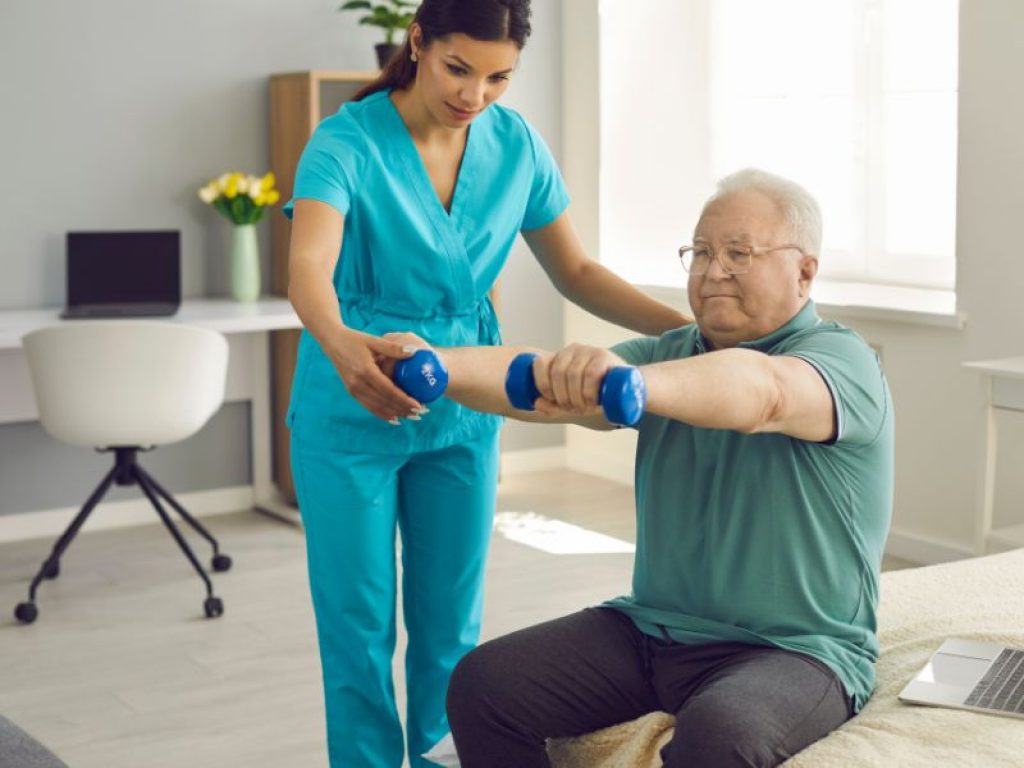
What Does A Sports Medicine Nurse Do?
A sports medicine nurse is a healthcare professional who provides medical care for athletes and other physically active individuals. Learn about this specialized nursing role’s responsibilities, qualifications, and career outlook in our comprehensive guide.
What Is A Sports Medicine Nurse?
A sports medicine nurse is a healthcare worker who focuses on treating and preventing injuries connected to sports and exercise physiology. A sports medicine nurse is a registered nurse who cares for athletes, coaches, and anyone who engages in sports and physical exercise. Injury prevention education, first aid and emergency care, assessment, diagnosis, treatment, rehabilitation, medical management, and referral to other healthcare experts are all services that fall under this category.
The sports medicine nurse coordinates care for professional athletes as part of a larger healthcare team, including doctors, physiotherapists, and athletic trainers. Thanks to their specialized training and skills, sports medicine nurses are essential in assisting athletes at all levels to attain peak health and performance.
What Does A Sports Medicine Nurse Do?
An NP who has completed additional training in sports medicine is called a sports medicine nurse practitioner. Patients with musculoskeletal issues benefit from their services, especially those that develop after a sports injury. The nurse practitioner specializing in sports medicine performs various tasks, including examination, diagnosis (including the interpretation of imaging studies like X-rays), and treatment.

They may be prescribed rest, medicine, splints/casts/braces, or physical therapy. A hospital, a university, or a professional sports organization could employ them. The seven most important responsibilities of a nurse practitioner in sports medicine are outlined below and elsewhere on this page.
Read diagnostic pictures, such as X-rays:
In sports medicine, x-rays are commonly ordered; properly interpreting them is essential for correct diagnoses. As part of your duties, you will be required to interpret and explain MRI and CT scan results to patients to provide appropriate recommendations for further treatment.
Inform your patients:
The role of the sports medicine NP includes constant instruction of clients, trainers, and loved ones. You’ll brief them on their prognosis, treatment options, and any necessary course corrections.
Create strategies for treatment:
Treatment plans will be developed following the completion of the assessment and the interpretation of diagnostic data. These plans can range in complexity from prescribing an NSAID and recommending physical therapy to prescribe and fitting a splint or cast, administering medication, or operating on the patient. The NP in sports medicine must also be flexible and willing to change the treatment strategy based on the patient’s progress.
You need to be adaptable:
An NP in sports medicine also needs to be adaptable. You must be flexible with your schedule as the day, week, or month progresses. This could involve working in a different location than you had anticipated, going out of town, or staying late to cover a sporting event. The response of a patient to an intervention is always a factor. Thus, you must be willing to adapt your treatment strategies accordingly.
Evaluate musculoskeletal injuries properly:
To be an MVP in the world of sports medicine, nurse practitioners must be able to diagnose and treat musculoskeletal injuries like a boss. They should be familiar with the tests that should be performed on which joints, musculature groups, etc., and what their results signify.
Collaborate with other medical professionals:
When caring for patients, a nurse practitioner in sports medicine collaborates with other medical professionals. Typical members of this group include a doctor, a radiologist, a physical therapist, and a nurse. All of these people need to be on the same page to ensure the best possible care for the patient.
Methods for casting and splinting:
Working in sports medicine requires a unique set of technical abilities. A nurse practitioner in sports medicine treats patients with musculoskeletal problems. Depending on the nature of the injury, you may need to use a variety of casts and splints. When necessary, you’ll also prescribe a splint that the patient can pick up at their local drugstore. Finally, you’ll check the patient once the casts have been removed to ensure they’re healing properly.
What are the fields of sports medicine nurse?
A sports medicine nurse is a trained medical professional specializing in evaluating and caring for athletes who have sustained injuries while participating in sports. Sports medicine nurses collaborate closely with athletes, coaches, and other medical experts to ensure that their patients receive the best treatment possible.
They are well-versed in both the mechanics of sports and the human body and have experience with injury prevention and rehabilitation. Professional sports teams, schools, clinics, and hospitals are just a few places where a sports medicine nurse could find employment. Sports Medicine Nurses are essential in sports because they help players stay healthy and perform at their peak.
What are the typical work settings for sports medicine nurse practitioners?
The majority of sports medicine nurse practitioners practice in outpatient clinics. The nurse practitioner in sports medicine may treat patients who have sustained injuries while participating in sports. They may also work in a university setting, where they can access training facilities and patient offices.
They might also run into them on the sidelines of the athlete’s game. The practice of sports medicine It is possible for NPs to work for both semi-professional and professional sports teams, where they would see patients in the team’s offices, locker rooms, and even on the sidelines.
How to become a sports medicine nurse?
This is a more complicated question than it seems, with an answer taking, on average, between six and eight years to uncover. The first step is earning your bachelor’s degree in nursing, which typically takes four years. It could take you longer than 4 years to earn your BSN if you decide to get your ADN first or attend classes part-time.
To become a sports medicine NP, you must earn a terminal degree, such as a master’s in nursing (MSN) or doctor of nursing practice (DNP). On average, you can spend two to four years pursuing one of these degrees. Starting with an MSN is a viable option for those beginning their academic career, as it allows for the possibility of returning to complete a DNP at a later time.
While unnecessary, you’ll benefit from having at least two years of nursing experience before applying to NP programs. Getting some experience in orthopedics or sports medicine is essential if you wish to work in that field as a nurse practitioner (NP). Studying this will teach you about various sports medicine diagnoses, treatment methods, and procedures.
What are the certificates for sports medicine nurses?
A Sports Medicine Nurse must have in-depth familiarity with the causes and treatment of injuries sustained while participating in sports. A registered nurse (RN) license is a prerequisite for working in sports medicine. A registered nurse who wishes to specialize in sports medicine must first earn her RN license.
The Certified Sports Nurse (CSN) and the Certified Strength and Conditioning Specialist (CSCS) are the two most common credentials for sports medicine nurses. These credentials validate expertise in recognizing and addressing sports-related ailments and maximizing athletic potential. Furthermore, they give you an advantage in the employment market and demonstrate your dedication to being the best sports medicine nurse you can be.
What skills are required for success as a Sports Medicine Nurse?
A number of fundamental abilities are needed to excel as a Sports Medicine Nurse and provide first-rate treatment to athletes and fitness buffs. First and foremost, competent diagnosis and treatment of sports injuries require a solid grounding in sports medicine and nursing. Collaboration with medical professionals, athletes, and coaches requires exceptional written and verbal communication skills.
Whether on the sidelines of a sporting event or in a rehabilitation center, nurses need to think quickly on their feet and solve complex problems to provide the best care possible to their patients. Finally, the ability to empathize and connect with patients is crucial to providing excellent care and enjoying success in the nursing profession.
How much does Sports Medicine Nurse Make?
Athletes and active people can rely on registered nurses’ expertise in sports medicine. A sports medicine nurse’s compensation can range from $60,000 to $110,000, based on factors including their education amount, years of experience, and geographic area.
PayScale reports that a Sports Medicine Nurse’s average annual income in the US is nearly $70,000. Salaries typically start at around $50,000 but can go well over $100,000 based on criteria like employer type, education level, and geographic region. Sports medicine nurses are in high demand, giving interested people a fantastic chance to launch a successful career and earn above-average wages.
What are the job prospects for nurses with a specialization in sports medicine?
Sports medicine nurses have many options for employment in the healthcare industry, and the job outlook is bright. These highly trained nurses are indispensable when evaluating, diagnosing, and treating sports-related injuries and illnesses. Clinics, rehabilitation facilities, collegiate and professional sports teams, and private practice are all viable choices for those trained in sports medicine.
There is a promising future for those who work in sports medicine due to the increasing need for fitness, wellness, and preventative treatment. In addition, sports medicine nurses can advance their careers in several ways, including by earning advanced certifications, developing subspecialty expertise (in areas like orthopedics or concussion management), and working as part of interdisciplinary teams of sports medicine professionals to deliver top-notch care to athletes of all ages and skill levels.
Conclusion
Sports Medicine Nurses are in high demand as athletes and active people increasingly rely on their expertise. With the right credentials, certification, and experience, nurses are well-positioned to pursue a fulfilling career in this field and earn above-average wages. The career prospects are excellent for Sports Medicine Nurses, and they have the opportunity to advance their career in sports medicine in several ways.







